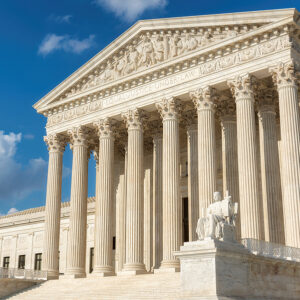Would you rather have a scientific expert at the Environmental Protection Agency determine the safe level of lead in our drinking water for you and your family, or a judge who may not have a scientific background?
Would you rather have experts at the Food and Drug Administration determine how best to protect you and your family from food-borne illness or a judge who is unlikely to have extensive training in food safety science?
Would you rather have engineers at the Department of Transportation determine safety standards for cars and trucks or a judge who is unlikely to have an engineering background?
This is at stake in two cases that the Supreme Court will hear this week, Loper Bright Enterprises v. Raimondo and Relentless v. Department of Commerce, which concern a longstanding legal doctrine referred to as Chevron deference.
The cases could have a significant effect on the ability of government experts to protect consumers, workers, the environment, and the public’s health and safety.
It is not an understatement to say that if the Supreme Court decides to overturn Chevron deference, Americans could face more polluted air and water, more unsafe consumer products and workplaces, more public health and safety threats, and more inaction on the climate crisis.
Chevron deference is based on commonsense and constitutional separation of powers principles: When Congress delegates authority to a federal agency to implement a law, but the law is ambiguous on a particular issue, courts reviewing a regulation required by that law should defer to the agency’s interpretation of the ambiguity in the law. Deference respects Congress’s decision to empower the agency and its expertise.
Congress, of course, cannot include in each piece of legislation all the details needed to implement it — lawmakers lack the time and the specialized knowledge. Nor can legislation adapt to new information and technology as effectively as agencies, which can be more responsive when regulations need to be updated. This is particularly important when new threats emerge.
For example, when Congress passed the Clean Air Act, it directed the EPA to put regulations that would reduce air pollution across the country, which was the law’s primary objective. Congress did not, however, spell out in detail exactly how much air pollution needed to be reduced; instead, it directed the EPA to establish national air quality standards based on current science. Thus, Congress intended to allow EPA to decide how best to protect Americans from toxic air pollution.
Agencies have other advantages in addition to their subject-matter expertise. Unlike judges, who are unelected and appointed for life, agencies are politically accountable to the public through the president and subject to congressional oversight. In addition, to issue regulations implementing laws, they must go through a process that involves giving the public notice and an opportunity to provide input. This is not the case for judicial opinions.
Since the Supreme Court first articulated and applied Chevron deference over 40 years ago, the doctrine has become one of the most cited legal precedents ever. And until recently, courts have relied on it to uphold countless regulations that have protected the public.
Unfortunately, over the past decade, corporate interests that want to roll back regulations have launched an assault on Chevron deference. They know that Chevron deference is a significant barrier to activist judges striking down regulatory protections.
Indeed, the whole point of Chevron deference is to prevent judges from second-guessing government agencies and throwing out regulations based on their personal preferences. Chevron deference ensures that when a court hears a legal challenge to a regulation, the outcome is determined by policy experts with deep knowledge rather than by which judge hears the case.
Sadly, those seeking to overturn Chevron deference have succeeded in getting the Supreme Court to hear two cases in which the court will consider whether to limit or even overturn this crucial legal doctrine.
Overturning Chevron would give more power to judges and less deference to agencies and their experts. It could threaten the health, safety, environmental and market safeguards that Americans expect and rely upon.
Ultimately, all of us could pay the price.


